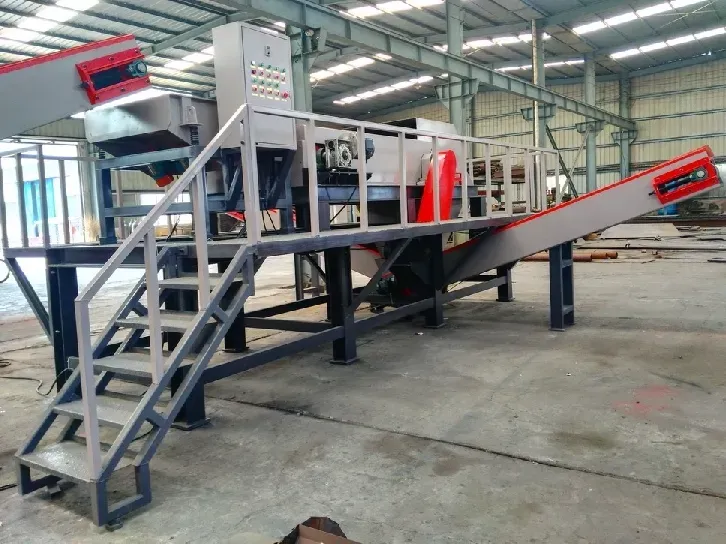
12 月 . 04, 2024 09:20 Back to list
Understanding Hammer Crushers An Essential Tool in the Industry
In various industries, the crushing of materials is a critical aspect of production processes. Among the multiple technologies available for fragmentation, the hammer crusher stands out as a versatile and effective solution. This article provides an in-depth look at hammer crushers, their working principle, advantages, applications, and maintenance practices, highlighting their significance across many sectors.
What is a Hammer Crusher?
A hammer crusher, also known as a hammer mill, is a type of size reduction equipment that utilizes high-speed rotating hammers to crush material. It is commonly used for the crushing of materials such as coal, gypsum, limestone, and other soft to medium-hard materials. The machine is designed to reduce the size of large pieces of material into smaller, manageable sizes, facilitating further processing in industrial applications.
Working Principle
The working principle of a hammer crusher is relatively straightforward. The material to be processed enters the crushing chamber, where it is impacted by rapidly rotating hammers. These hammers are attached to a rotor that spins at high speeds, striking the material with significant force. The crushed material then exits through a screen or grate that determines the desired particle size. This process not only breaks the material down physically but can also alter its shape and structure, producing a consistent and uniform output.
Advantages of Hammer Crushers
1. Versatility One of the most significant advantages of hammer crushers is their versatility. They can handle various materials, ranging from soft to medium-hard, making them suitable for numerous applications in different industries.
2. High Reduction Ratio Hammer crushers offer a high reduction ratio, efficiently reducing large volumes of material into smaller sizes. This capability is particularly beneficial in industries that require bulk processing and rapid material handling.
3. Cost-Effectiveness These machines are often more affordable than other types of crushers, particularly for smaller operations. Additionally, their efficient design can lead to cost savings in labor and energy consumption.
4. Ease of Maintenance Hammer crushers are designed for easy access and maintenance. Regular upkeep is crucial for optimal performance, but the straightforward design minimizes downtime and maintenance expenses.
Applications

Hammer crushers are widely used across many industries, including
- Mining In mining operations, hammer crushers break down ores and minerals into smaller pieces, facilitating further processing and extraction. - Construction They are employed in the construction industry to crush concrete, bricks, and other building materials, making recycling and reuse more efficient.
- Agriculture In agricultural applications, hammer mills are utilized to grind grain, feed, and other organic materials into finer particles for better digestibility in animal feed.
- Waste Management Hammer crushers play a role in waste management by reducing the size of waste materials, making them easier to transport and process for recycling.
Maintenance Practices
To ensure the longevity and efficiency of a hammer crusher, regular maintenance is essential. Key practices include
- Regular Inspections Routine inspections of hammers, grates, and other components help identify wear and tear before they lead to significant issues.
- Replacement Parts Keeping a stock of replacement hammers and screens can reduce downtime and maintain operational efficiency.
- Lubrication Adequate lubrication of moving parts is crucial to minimize friction and wear, ensuring smooth operation.
- Operational Training Proper training for operators can significantly reduce the risk of mishandling and extend the lifespan of the machine.
Conclusion
Hammer crushers are an invaluable tool in various industries, offering efficient size reduction and adaptability for a wide array of materials. Their simplicity, effectiveness, and cost-efficiency make them a popular choice for many applications. By understanding their principles, advantages, applications, and necessary maintenance, operators can maximize the performance of hammer crushers, contributing to the overall efficiency of production processes. As industries continue to evolve, the importance of reliable and versatile equipment like the hammer crusher remains ever relevant.
Latest news
Unveiling the Power of Eddy Current Separator
NewsSep.25,2024
Transform Your Home Recyclin:home metal shredder
NewsSep.25,2024
The Future of Waste Management with Recycling Line Picker
NewsSep.25,2024
The Benefits of a Metal Recycling Plant
NewsSep.25,2024
Revolutionize Material Separation with Onwang Technology
NewsSep.25,2024
Innovative Waste Management: Unveiling the MSW Sorting Plant
NewsSep.25,2024